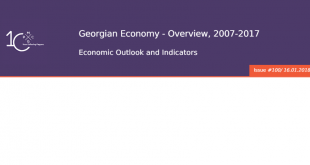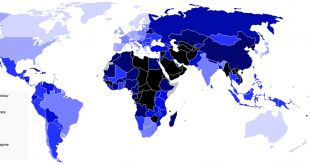Georgia has dramatically simplified licensing and permitting requirements to ease constraints on business. The total number of licenses and permits was reduced by 84% in reforms that eliminated 756 licenses and permits and streamlined procedures. Currently, licenses and permits are only used for the production of highly risky goods and services, along with usage of natural resources and specific activities. The procedures of issuing licenses and permits were significantly simplified to the “one-stop shop” and “silence is consent” principles.
Georgian legislation concerning export tariffs states that export or re-export of goods from Georgia is duty-free. Moreover, from 1 September 1997, Georgia applied the country of destination principle in VAT taxation and therefore, exports from Georgia are VAT-exempt.
From January 1, 2011 the new Tax Code of Georgia took effect which also includes the provisions regulating customs. Tax Code established business friendly customs procedures. Customs Tariffs Reform significantly eased and sharply reduced the costs connected to the foreign trade.
Customs Clearance
Certificate of origin of a product is required to export goods. Certificate of origin allows exporter to enjoy relevant benefits in a recipient country.
When removing goods from customs territory of Georgia, a certificate of origin shall be issued by an authorized body of the Ministry of Economy and Sustainable Development of Georgia or the legal entity of public law of the Ministry of Finance of Georgia, Revenue Service, or Chamber of Commerce and Industry of Georgia or authorized bodies in the autonomous republics of Georgia, identified by Ministry of Economy and Sustainable Development of Georgia and Ministry of Finance of Georgia. Certificate of origin for products made of grapes is issued by National Wine Agency, a legal entity of public law of the Ministry of Agriculture of Georgia, in accordance with the rule defined by the Ministry of Agriculture.
Certificates of Origin
The Certificates of Origin is issued by two different entities in Georgia:
Types of Certificates of Origin:
- Certificate Form A is issued on specific goods originating in Georgia exported to the countries (USA, Canada, Japan, Switzerland, and Norway), from which Generalized System of Preferences (GSP) is granted.
- Certificate CT-1 is issued on goods originating in Georgia exported to the CIS countries
- Certificate EUR1 is issued on goods originating in Georgia exported to Turkey and the European Union. Rules of Origin: European Union, Turkey (issued by Revenue Service of Georgia)
- Non-Preferential Certificate of Origin (Certificate of Origin) is issued on goods exported to all other countries as well as to the above mentioned countries, while products do not meet the criteria of preferential rules of origin. Besides, this Certificate is also granted to goods produced in another country and exported from Georgia.
Necessary documents for obtaining certificate of origin of the product:
- Application of an exporter
- Declaration of Origin of Goods and its Possession
- Contract (Agreement)
- Invoice
Customs Regime for Export
Georgian exports are exempt from customs duties:
- Export duties mean: customs fee or/and duty payable for the removal of goods from the customs territory of Georgia.
- Export operations are VAT-exempt
- Export or re-export of goods from Georgia is duty-free
- Exports from Georgia are VAT-exempt
Preferential Trade Regimes
- Most Favored Nation
Most Favored Nation (MFN) regime is one of the fundamental principles of the World Trade Organization (WTO) and an important element of non-discriminative treatment in trade. It means that countries eligible for this regime must receive equal trade advantages when entering the market and may not be treated less advantageously than any other country with MFN status (with certain exceptions).
- Free Trade Agreement
Free Trade Agreement (FTA) is an agreement where two countries do not use customs duties in bilateral trade. Georgia has FTAs with European Union, CIS countries (Azerbaijan, Moldova, Ukraine, Uzbekistan, Kazakhstan, Turkmenistan, Russia, Armenia) and Turkey.
Note: Currently Georgia has an ongoing negotiations on Free Trade Agreement with European Free Trade Association (Republic of Iceland; Principality of Lichtenstein; Kingdom of Norway; Swiss Confederation)
- Generalized System of Preferences
The idea behind the Generalized System of Preferences (GSP) is that developed countries assist less developed countries in promoting their exports. To this end, developed countries unilaterally grant (without demanding reciprocal concessions) certain preferences in foreign trade to GSP beneficiaries. In particular, they set lower (or zero-rated) tariffs for imports from GSP recipient countries in order to facilitate the access of products from developing countries to developed markets.
Georgia has been granted the GSP treatment by the following countries: the USA, Japan, Canada, Switzerland and Norway.
Certificates and Licenses
- Phitosanitary Certificate-The phytosanitary certificate is an official declaration stating that plants and plant material exporting are free from pests and diseases, so as to prevent introduction and spread of any pests in the importing countries
- Veterinary Certificate-The Veterinary Certificate is required by importing country when live Animals or products of animal origin are imported in the country. Veterinary Certificate is issued by Legal Entity of Public Law – National Food Agency or in the control zones defined by the Tax Code of Georgia Legal Entity of Public Law – Georgia Revenue Service, except for the cases when for issuance of the certificate It is necessary to : Place animals in the quarantine or/and Take samples for analyses
- Higienic Certificate-Hygiene certificate Is the document which certifies that food–stuff/tare is in accordance with the hygiene safety requirements. The Higienic Certificate is by the control zones defined by the Tax Code of Georgia Legal Entity of Public Law – Georgia Revenue Service,Legal Entity of Public Law – National Food Agency
Information on the quality of product is necessary when exporting goods from Georgia, as well as the information on entities that can provide quality certification service in the country. Most countries apply the WTO Agreement on Sanitary and Phytosanitary Measures (SPS Agreement) to regulate requirements for food products and animal fodder. Therefore it is recommended to learn more information about these measures from the WTO webpage.
Quality certification systems such as ISO; OHSAS; HACCP are widely applied in International Trade.
- ISO catalogue includes 18000 standards that are classified in accordance with International Classification for Standards. These standards enable producers, sellers and consumers to set uniform requirements for the product. When a product is certified under this system, a country of its origin does not matter. Uniform international standards facilitate and simplify trade as sellers and buyers use a common international language in quality-related issues. ISO involves various series: 9000; 14000; 22000; 25000.
- OHSAS 18000 is an occupational health and safety management system. It consists of two series: 18001 and 18002.
HACCP is a management system in which food safety is addressed through the analysis and control of biological, chemical, and physical hazards at any stage of production from raw Material procurement to manufacturing, distribution and consumption of the finished product.
- Quality Certificate
Quality certificates can be obtained from laboratories that operate in Georgia and are registered in the National Accreditation Body – Accreditation Center (GAC)
Quality testing and calibration/verification laboratories, certification bodies in Georgia:
Seekers of ISO; OHSAS; HACCP certificates should approach the following organizations: Georgian Quality Foundation, Georgian Employers Association and GDCI Management Systems.
When is export license required?
Georgia has one of the most liberal export regimes, however, some regulations apply to the following exports.
- Objects of national heritage (cultural valuables) of Georgia (Ministry of Culture and Monument Protection of Georgia)Electronic surveillance facilities (Ministry of Internal Affairs of Georgia)
- Products with limited turnover (Ministry of Environment Protection and Natural Resources of Georgia) (suspended until1July2011);
- Weapons and ammunitions (Ministry of Defense of Georgia)
- Products of dual use (Ministry of Economy and Sustainable Development of Georgia
- Medicines that are subject to special control (Regulatory Agency of Medical Activity of Ministry of Labor, Health and Social Affairs of Georgia)
- Flora and fauna on the verge of extinction (Ministry of Environment Protection and Natural Resources)
***
The source of the article is tradewithgeorgia.com (Entrepreneurship Development Agency – Enterprise Georgia).
Copyright on the material is protected. In case of it’s full or partial publication, please indicate at it’s beginning – “Source: business.org.ge”
 business.org.ge Portal for Entrepreneurs
business.org.ge Portal for Entrepreneurs






